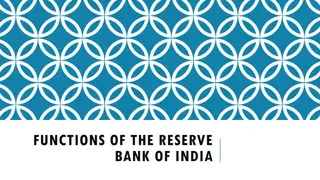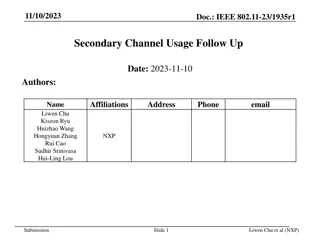Understanding the Primary Market and Its Functions
The primary market, also known as the new issue market, is where industrial securities are issued for the first time to the public. It plays a crucial role in mobilizing savings and channelizing them for productive purposes. Through processes like IPOs and FPOs, companies raise capital for various needs. Major participants in the primary market include merchant bankers, registrars, underwriters, and more, who support the issuance of securities. This market helps in capital formation and provides companies with the funds needed for growth and expansion.
Download Presentation

Please find below an Image/Link to download the presentation.
The content on the website is provided AS IS for your information and personal use only. It may not be sold, licensed, or shared on other websites without obtaining consent from the author. Download presentation by click this link. If you encounter any issues during the download, it is possible that the publisher has removed the file from their server.
E N D
Presentation Transcript
Primary Market Primary Market (new issue market) - The financial market concerned with the fresh issue of industrial securities is called as primary market. It is also called as new issue market. In this market, industrial securities which are issued for the first time to the public are dealt. The industries issue new securities against long-term funds from the public. This market consists of all financial institutions, which contribute, underwrite, and directly subscribe to the securities. The main securities that are dealt in primary market are shares and debentures.
Functions of primary market The primary market plays a very important role of mobilizing the savings and channelizing the same for productive purposes. For the purpose of mobilizing the savings, shares and debentures are issued by the companies. Depending upon the time and purpose of issue, it is classified into two categories, viz., Initial Public Offering (IPO) and Follow-on Public Offering (FPO). When the companies issue shares to the public, for the first time, for the purpose of raising initial capital, it is called as Initial Public Offering (IPO). When the companies issue shares to the public, subsequently, for the purpose of raising additional capital, it is called as Follow-on Public Offering (FPO). Through IPO & FPO, capital formation takes place in the primary market. The capital formation is done in four ways viz., Public Issue, Offer for Sale, Rights Issue and Private Placement. - Under Public Issue the industries raise capital by sale of securities to the general public. - Under Offer for Sale the industries raise capital by outright sale of securities to the intermediaries like Issue Houses and Share Brokers - Under Rights Issue the industries raise additional capital by sale of securities to the existing shareholders on a preferential basis and - Under Private Placement the industries raise fresh or additional capital by sale of securities to a small group of investors in the known circle.
Significance/importance/features of primary market 1. It is a market for the fresh issue of shares, debentures, etc. 2. It helps companies to raise capital and long-term loans. 3. It includes various financial institutions that support the fresh issue of securities. 4. It enables formation of capital by channelizing the savings of the public. 5. It provides companies sufficient funds for starting a new enterprise, for expansion of the existing enterprise, for diversification of existing operations, etc.
Major participants in the primary market 1. Merchant bankers who look after the issue management completely 2. Registrars to issue who undertake all activities connected with servicing of the investors 3. Collecting Bankers and Coordinating Bankers who collect the subscription from the public in cash, cheque, stock invest, etc., 4. Underwriters and Brokers who take up the responsibility of ensuring complete subscription of the issue 5. Printers, Advertising agencies, Mailing agencies, etc., who take up the task of reaching the subscribers.
Advantages of Primary Market 1. Very important avenue for investors 2. Productive use of the economy s savings 3. Facilitate capital formation 4. Offer reasonable rate of return on savings 5. Facilitate production and productivity 6. Induce economic growth 7. Promotion of stability in values of securities 8. Facilitate technological up-gradation
Disadvantages of Primary Market 1. Possibility of deceiving the investors 2. No fixed norm for project appraisal 3. Lack of post-issue seriousness 4. Ineffective role of merchant bankers 5. Delay in allotment process 6. Poor mobilization of savings 7. Hesitancy among the investing public

















































